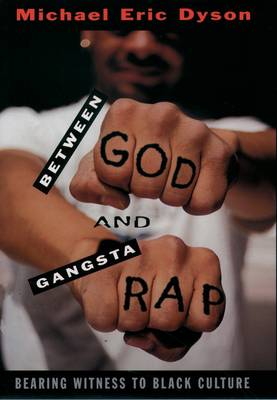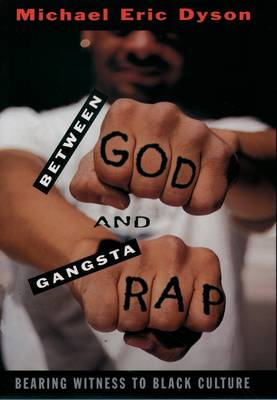
- Afhalen na 1 uur in een winkel met voorraad
- Gratis thuislevering in België vanaf € 30
- Ruim aanbod met 7 miljoen producten
- Afhalen na 1 uur in een winkel met voorraad
- Gratis thuislevering in België vanaf € 30
- Ruim aanbod met 7 miljoen producten
Zoeken
€ 25,95
+ 51 punten
Omschrijving
A former welfare father from the ghetto of Detroit, Michael Eric Dyson is today a critic, scholar, and ordained Baptist minister who has forged a unique role: he is a compelling spokesman for the concerns of the black community, and also a leader who has a genuine rapport with that community, particularly with urban youth. In his essays, lectures, sermons, and books, he has emerged as one of the leading African-American voices of our day.
Dyson's passion for contemporary black culture informs Between God and Gangsta' Rap, his latest foray into the ongoing debate about African-American identity which embraces the hopes of the church and the cool reality of hip-hop. Bringing together writings on music, religion, politics, and identity, and offering a multi-faceted view of black life, the book charts the progress of Dyson's own soul, from his roots in the Detroit ghetto, to his current status as a Baptist minister, professor, cultural critic, husband, and father. Dyson opens with a letter to his brother, who is serving life in prison on a murder charge. This painful piece reveals a violence in the author's own family that sets the tone for themes that will emerge throughout these writings: violence on the black body and soul; the redemptive power of hope through school, church, and family; sexuality as a source of anguish and of joy; and the struggle with entrenched white racism. There is a section of wonderful profiles Dyson calls "Testimonials"--studies of black men, from O.J. Simpson to Marion Barry, and from Baptist preacher Gardner Taylor to Michael Jordan and Sam Cooke. In "Obsessed with O.J.," Dyson offers an extremely personal and insightful series of reflections on the case. In "Lessons," Dyson takes up the subjects of politics and racial identity. Newt Gingrich and moral panic, Quabiliah Shabazz, Carol Moseley Braun, the NAACP, Martin Luther King, Jr., and Malcolm X all figure in these insightful and accessible pieces. And "Songs of Celebration" draws from Dyson's writings for the popular press such as Rolling Stone and Vibe, and explores the joys and pitfalls of black expression, from the black vernacular bible to gospel music, R & B, and hip-hop. Dyson concludes with an essay framed as a letter to his wife, which offers a positive counterbalance to the opening address to his brother. The letter serves as a tribute to the redemptive powers of love, the black family, spirit, and change.
Arguing that the richness of black culture today can be found in the interstices--between god and gangsta' rap--Dyson charts the progress and pain of African Americans over the past decade, showing that brilliance and beauty, pain and drudgery are components of this changing culture. As a compendium of his thinking about contemporary culture Between God and Gangsta' Rap will find a wide audience among black and white readers.
Dyson's passion for contemporary black culture informs Between God and Gangsta' Rap, his latest foray into the ongoing debate about African-American identity which embraces the hopes of the church and the cool reality of hip-hop. Bringing together writings on music, religion, politics, and identity, and offering a multi-faceted view of black life, the book charts the progress of Dyson's own soul, from his roots in the Detroit ghetto, to his current status as a Baptist minister, professor, cultural critic, husband, and father. Dyson opens with a letter to his brother, who is serving life in prison on a murder charge. This painful piece reveals a violence in the author's own family that sets the tone for themes that will emerge throughout these writings: violence on the black body and soul; the redemptive power of hope through school, church, and family; sexuality as a source of anguish and of joy; and the struggle with entrenched white racism. There is a section of wonderful profiles Dyson calls "Testimonials"--studies of black men, from O.J. Simpson to Marion Barry, and from Baptist preacher Gardner Taylor to Michael Jordan and Sam Cooke. In "Obsessed with O.J.," Dyson offers an extremely personal and insightful series of reflections on the case. In "Lessons," Dyson takes up the subjects of politics and racial identity. Newt Gingrich and moral panic, Quabiliah Shabazz, Carol Moseley Braun, the NAACP, Martin Luther King, Jr., and Malcolm X all figure in these insightful and accessible pieces. And "Songs of Celebration" draws from Dyson's writings for the popular press such as Rolling Stone and Vibe, and explores the joys and pitfalls of black expression, from the black vernacular bible to gospel music, R & B, and hip-hop. Dyson concludes with an essay framed as a letter to his wife, which offers a positive counterbalance to the opening address to his brother. The letter serves as a tribute to the redemptive powers of love, the black family, spirit, and change.
Arguing that the richness of black culture today can be found in the interstices--between god and gangsta' rap--Dyson charts the progress and pain of African Americans over the past decade, showing that brilliance and beauty, pain and drudgery are components of this changing culture. As a compendium of his thinking about contemporary culture Between God and Gangsta' Rap will find a wide audience among black and white readers.
Specificaties
Betrokkenen
- Auteur(s):
- Uitgeverij:
Inhoud
- Aantal bladzijden:
- 240
- Taal:
- Engels
Eigenschappen
- Productcode (EAN):
- 9780195115697
- Verschijningsdatum:
- 30/01/1997
- Uitvoering:
- Paperback
- Formaat:
- Trade paperback (VS)
- Afmetingen:
- 137 mm x 204 mm
- Gewicht:
- 185 g

Alleen bij Standaard Boekhandel
+ 51 punten op je klantenkaart van Standaard Boekhandel
Beoordelingen
We publiceren alleen reviews die voldoen aan de voorwaarden voor reviews. Bekijk onze voorwaarden voor reviews.







